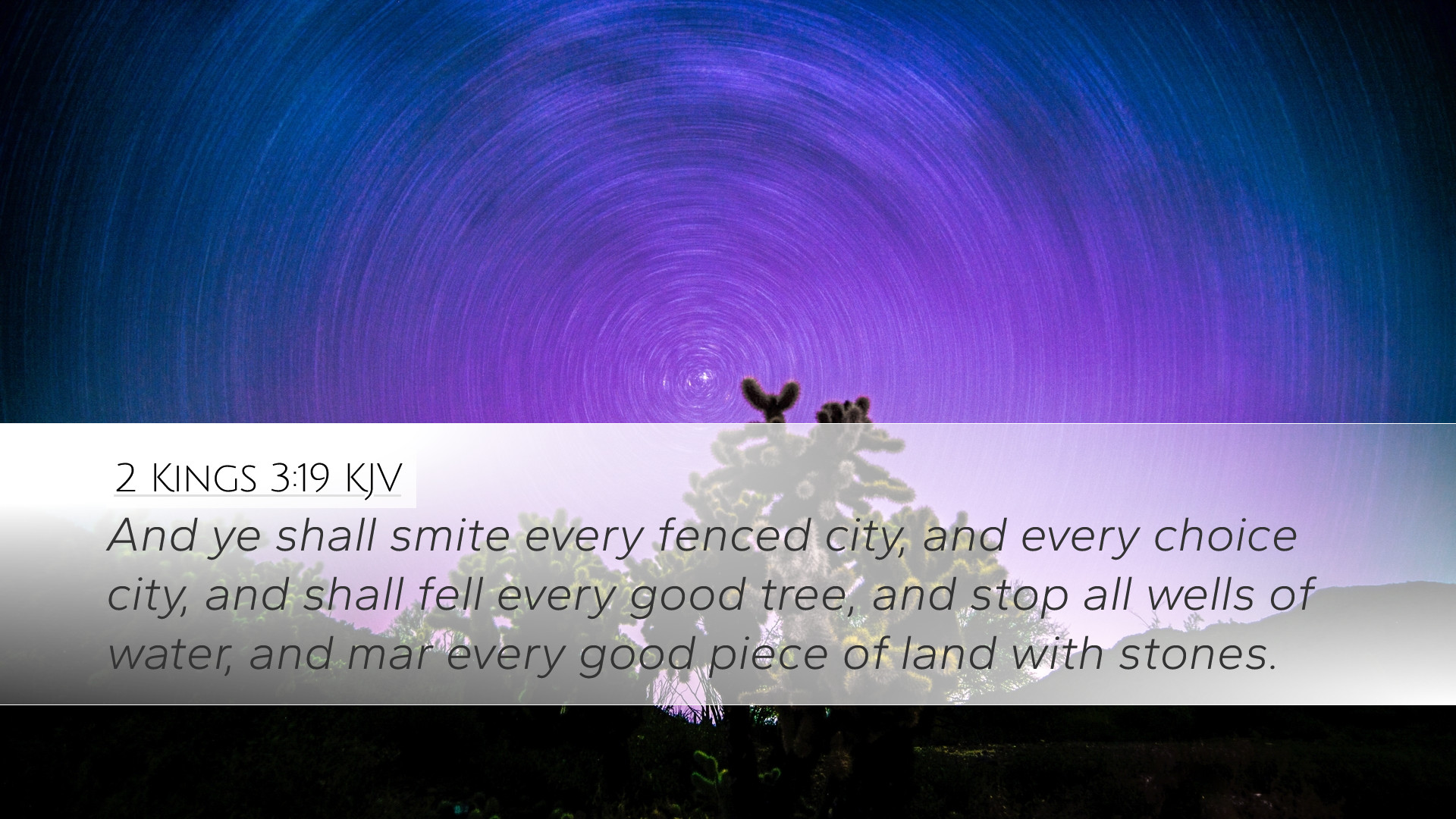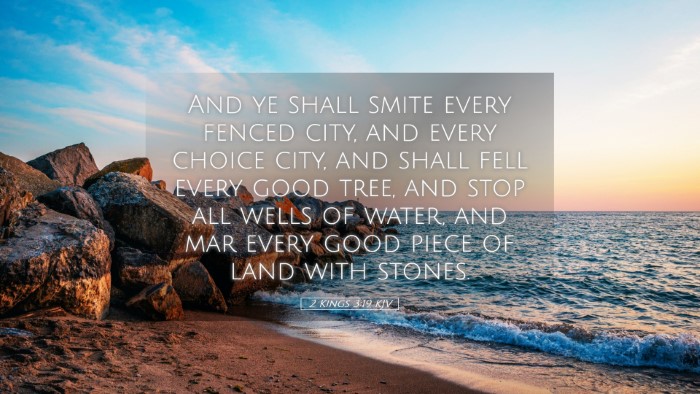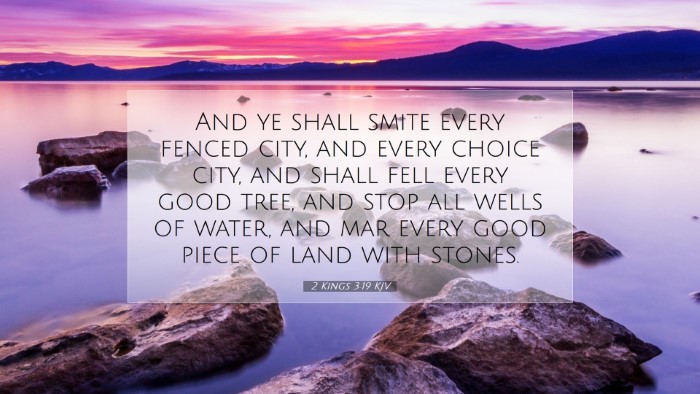Commentary on 2 Kings 3:19
Verse: "And ye shall smite every fenced city, and every choice city, and shall fell every good tree, and stop all wells of water, and mar every good piece of land with stones."
Introduction
The verse from 2 Kings 3:19 provides a solemn command issued through the prophet Elisha during a time of conflict and spiritual challenge for the kingdoms of Israel, Judah, and Edom. This directive carries profound implications for pastoral teachings, theological reflection, and spiritual application. The following commentary synthesizes insights from recognized public domain biblical scholars, including Matthew Henry, Albert Barnes, and Adam Clarke.
Contextual Analysis
To fully grasp the weight of 2 Kings 3:19, we must first consider the historical and narrative context in which this command was given. The passage follows a narrative where King Jehoram of Israel sought to ally with King Jehoshaphat of Judah and the king of Edom against Moab, which had rebelled against Israel. This coalition, amid spiritual decline and enemy confrontation, precipitated a dire situation where divine guidance through Elisha became crucial.
Historical Background
Matthew Henry notes that Israel had been embroiled in a cycle of idolatry and conflict that weakened its political and spiritual standing. The coalition against Moab can be seen as both a military strategy and a desperate measure to regain lost honor. Elisha's prophecy in verse 19 underlines not merely military tactics but a profound spiritual reality—divine judgment against a rebellious nation.
The Command to Destroy
The directives provided in this verse illustrate a comprehensive plan of destruction that reflects the intensity of divine judgment. The emphasis on smiting every fenced city and choice city underscores the totality of Israel’s approach against its foes.
Divine Judgment
Albert Barnes elucidates that this command serves as a harsh reminder of God's judgment against nations that oppose His will. The "fenced cities" represent fortified, secure locations—a metaphor for human strength and defense mechanisms that are ultimately futile when standing against divine authority. The choice cities suggest areas of wealth and influence, indicating that God's plan would dismantle both the security and the resources of the opposition.
Destruction of Resources
Moreover, the directive to fell good trees and stop up wells of water reveals a strategy aimed not just at immediate conquest but at crippling the economic and agricultural capabilities of the Moabites. Adam Clarke points out that stopping wells was particularly devastating; water represents life and sustenance. The act of marring good pieces of land with stones would leave the land desolate, symbolizing complete devastation.
Theological Reflections
This passage invites deeper theological reflections on the themes of divine sovereignty, judgment, and restoration. Each element of the command can be seen as a reflection of God's holiness and justice in dealing with sin among nations.
God's Sovereignty
Matthew Henry emphasizes that God, who gives authority, also has the right to revoke it. The destructive command signifies a transitional moment for Israel and Moab alike, suggesting that divine sovereignty reigns in history. It can also provide comfort to believers in understanding that God ultimately fulfills His purposes, even through seemingly harsh means.
The Seriousness of Sin
The harshness of the judgment in 2 Kings 3:19 serves as a poignant reminder of the seriousness of sin. Adam Clarke notes that such drastic measures befall communities and nations that persist in rebellion against God. This can resonate with modern readers, especially in a time where moral decline is apparent. The reality portrayed serves as a divine caution against complacency and spiritual apathy.
Hope for Restoration
While the command in this verse illustrates judgment, the overarching narrative of 2 Kings conveys a message of potential restoration. God’s involvement in history is not solely punitive but also redemptive. After judgment often comes the opportunity for repentance and renewal.
Practical Applications
For pastors, theologians, and students of the Bible, this verse offers various practical applications that resonate today.
- Understanding Judgment: Reflecting on the nature of God’s judgment can help in pastoral contexts where tough truths need to be conveyed with love and grace.
- Spiritual Vigilance: Believers are reminded to remain spiritually vigilant, recognizing the destructive patterns of sin and the complete nature of God’s call to holiness.
- Resource Stewardship: The imagery of destroyed resources calls for careful consideration of how churches and individuals steward the blessings and resources God has provided.
- Seeking Restoration: The narrative encourages believers to seek restoration and renewal, recognizing that even after judgment, God provides opportunities for redemption through repentance.
Conclusion
In conclusion, 2 Kings 3:19 serves as a complex and layered text that invites deep reflection on God’s character in relation to humanity’s choices. Through the insights of public domain commentaries, we have examined the text’s historical context, divine judgment, and practical implications. Ultimately, this verse challenges us to engage with the reality of sin, the certainty of judgment, and the hope of restoration found in God’s unwavering sovereignty and grace.


